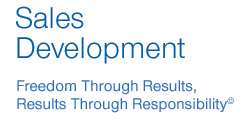Don’t Overcome Sales Objections. Eliminate Them.
August 5th, 2011What is your most Challenging Closing Scenario? How are you going to deal with it?
The economy is uncertain. Business leaders tell us more and more that their targeted sales prospects are becoming increasingly resistant to part with their money. This translates into longer sales cycles, lower revenues, shrinking margins and growing frustration.
The same stalls and objections come up over and over, and executives want to know how to overcome them. Do these sound familiar?
“I can’t afford it.”
“We don’t have it budgeted.”
“Can you offer me a better price?”
“It’s on the radar, but it’s not a priority this month.”
“I need to check with my (committee, boss, board, partner, etc..).”
“We’re really busy this month, so I don’t have time right now."
“Can you call me back next Tuesday…?”
“Can you send me some references?”
and everyone’s favorite…
“I need to think about it.”
Each of these objections are quoted directly out of The Traditional Buyer’s Handbook for Dealing with Untrustworthy Salespeople.
Salespeople ask me all the time: “What can I say to overcome these objections?” Unfortunately, this is the wrong question. Here are some better questions:
- Who is CREATING the objections in the first place?
- What is it that your buyers are objecting to?
- Why are they really objecting?
- Instead of overcoming objections, wouldn’t it be better to AVOID them?
Salespeople are looking for simple phrases or silver bullets. But this mindset and thinking is exactly what creates the problem in the first place. They want to know how to SELL the buyer, instead of simply listening, understanding, facilitating mutual discovery, and helping solve problems to make people feel better.
What salespeople really need is a completely new paradigm. They need to THINK differently. Prospects only act like traditional buyers by tossing out objections when salespeople try to convince them to buy. In other words, if you don’t act like a Salesman, they won’t (can’t) act like a Buyer.
Objections all begin with YOU. You create objections by your thinking and behavior. You can ELIMINATE them in the same way.
If you give Buyers nothing to object to, how can they object?
Stay tuned. I’ll be blogging more on this in coming weeks…
Copyright © Joe Zente 2011. All Rights Reserved.









